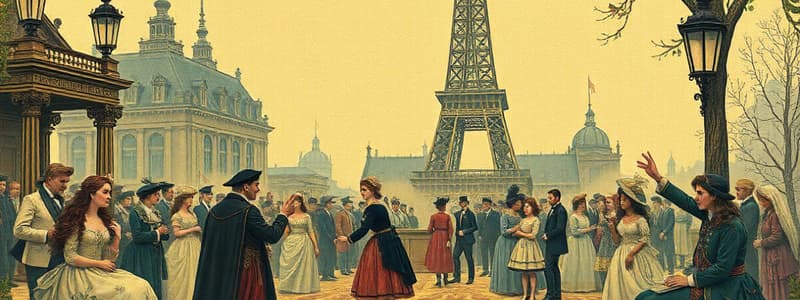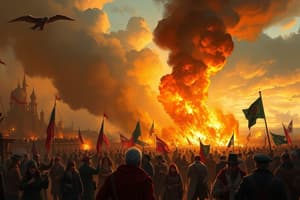Podcast
Questions and Answers
Voltaire was known for his support of the Church and religious intolerance.
Voltaire was known for his support of the Church and religious intolerance.
False (B)
Montesquieu advocated for a system of checks and balances within government.
Montesquieu advocated for a system of checks and balances within government.
True (A)
Diderot was focused solely on political issues and did not contribute to the sciences.
Diderot was focused solely on political issues and did not contribute to the sciences.
False (B)
Rousseau argued against the importance of education in society.
Rousseau argued against the importance of education in society.
The Enlightenment thinkers had no impact on the revolutionary process in France.
The Enlightenment thinkers had no impact on the revolutionary process in France.
Quesnay argued for more restrictions on the production and movement of goods in France.
Quesnay argued for more restrictions on the production and movement of goods in France.
The Enlightenment was characterized by an emphasis on argument and debate regarding public issues.
The Enlightenment was characterized by an emphasis on argument and debate regarding public issues.
The lack of sympathy for reforms after 1789 led to the execution of the French king in 1793.
The lack of sympathy for reforms after 1789 led to the execution of the French king in 1793.
The lower nobility were generally supportive of the higher nobility's power at Versailles.
The lower nobility were generally supportive of the higher nobility's power at Versailles.
King Louis XVI sought to preserve the absolute power he inherited.
King Louis XVI sought to preserve the absolute power he inherited.
Local parlements had the authority to block the implementation of royal wishes.
Local parlements had the authority to block the implementation of royal wishes.
Intendants were well-liked by local parlements and easily supported in their administrative roles.
Intendants were well-liked by local parlements and easily supported in their administrative roles.
Some factions at court wanted to return to a system where the king had to consult the aristocracy on matters of policy.
Some factions at court wanted to return to a system where the king had to consult the aristocracy on matters of policy.
King Louis XVI was crowned when he was of advanced age and very experienced.
King Louis XVI was crowned when he was of advanced age and very experienced.
The divisions among courtiers made it easy to reach consensus on major decisions.
The divisions among courtiers made it easy to reach consensus on major decisions.
Louis XVI was generally indifferent to the need for reform in France.
Louis XVI was generally indifferent to the need for reform in France.
The Assembly of Notables was composed entirely of nobles.
The Assembly of Notables was composed entirely of nobles.
Calonne was well-supported by the Notables during his tenure.
Calonne was well-supported by the Notables during his tenure.
The refusal of the king to provide an accurate account of royal finances led to the dismissal of the Assembly.
The refusal of the king to provide an accurate account of royal finances led to the dismissal of the Assembly.
Brienne, as the new finance minister, had strong support from the king.
Brienne, as the new finance minister, had strong support from the king.
The financial crisis in France was perceived to be over after the expensive war ended.
The financial crisis in France was perceived to be over after the expensive war ended.
The public was well-informed about the true state of the royal finances.
The public was well-informed about the true state of the royal finances.
Brienne increased taxes and found it easy to persuade bankers to lend money to France.
Brienne increased taxes and found it easy to persuade bankers to lend money to France.
The Assembly of Notables had clear authority and a well-defined role.
The Assembly of Notables had clear authority and a well-defined role.
The French government had high confidence during the time of the writers' arguments.
The French government had high confidence during the time of the writers' arguments.
France lost Canada to Britain in the war of 1763.
France lost Canada to Britain in the war of 1763.
Marie Antoinette was well-liked by the people of France.
Marie Antoinette was well-liked by the people of France.
Jacques Necker was a French aristocrat appointed as finance minister.
Jacques Necker was a French aristocrat appointed as finance minister.
Louis XVI took advice from Turgot regarding the risks of war.
Louis XVI took advice from Turgot regarding the risks of war.
The decision to ally with the American colonists was made in 1778.
The decision to ally with the American colonists was made in 1778.
The Ancien Régime collapsed after 1789, leading to the emergence of new leaders in France.
The Ancien Régime collapsed after 1789, leading to the emergence of new leaders in France.
The Comte de Vergennes was focused on the financial aspects of France's involvement in wars.
The Comte de Vergennes was focused on the financial aspects of France's involvement in wars.
The king initially agreed to support tax increases after the parlement requested an accurate picture of royal accounts.
The king initially agreed to support tax increases after the parlement requested an accurate picture of royal accounts.
The rejection of tax increases by the parlement led to the arrest of its leaders.
The rejection of tax increases by the parlement led to the arrest of its leaders.
The protests following the king's actions were limited to the lower classes of Paris.
The protests following the king's actions were limited to the lower classes of Paris.
By August 1788, the financial state of France had improved significantly.
By August 1788, the financial state of France had improved significantly.
Brienne was supportive of the king's refusal to acknowledge the financial crisis.
Brienne was supportive of the king's refusal to acknowledge the financial crisis.
The tension in France was exacerbated by a series of hailstorms that ruined the summer harvest.
The tension in France was exacerbated by a series of hailstorms that ruined the summer harvest.
The king showed effective leadership and management during the financial crisis of 1787 and 1788.
The king showed effective leadership and management during the financial crisis of 1787 and 1788.
Pamphlets demanding social, economic, and political change were widely circulated in France.
Pamphlets demanding social, economic, and political change were widely circulated in France.
The Third Estate wanted only basic improvements to their lives.
The Third Estate wanted only basic improvements to their lives.
The First and Second Estates supported the demands for reform made by the Third Estate.
The First and Second Estates supported the demands for reform made by the Third Estate.
The Tennis Court Oath was a commitment by the Assembly to establish a new constitution.
The Tennis Court Oath was a commitment by the Assembly to establish a new constitution.
There was clear leadership from the king on issues of reform.
There was clear leadership from the king on issues of reform.
The National Assembly announced that sovereignty lay with the monarchy.
The National Assembly announced that sovereignty lay with the monarchy.
Hunger in 1789 was due to poor harvests from the previous year.
Hunger in 1789 was due to poor harvests from the previous year.
Jacques-Louis David painted the Tennis Court Oath to commemorate the National Assembly's actions.
Jacques-Louis David painted the Tennis Court Oath to commemorate the National Assembly's actions.
Clergy and noblemen fully supported the changes proposed by the Third Estate.
Clergy and noblemen fully supported the changes proposed by the Third Estate.
Flashcards
French Social Hierarchy
French Social Hierarchy
The French social hierarchy was divided into three estates: the clergy, the nobility, and the commoners. The nobility was further divided into the 'higher' nobility and the 'lower' nobility. The lower nobility often resented the power and wealth of the higher nobility.
Lower Nobility
Lower Nobility
The 'lower' nobility was comprised of those with less wealth and power compared to the 'higher' nobility. They held titles but lacked significant landholdings and influence.
King Louis XVI's Challenges
King Louis XVI's Challenges
The French king, Louis XVI, inherited the monarchy in a time of immense pressure and needed to make choices that would satisfy different groups. The nobility, clergy, and commoners demanded change, each with their own needs and desires.
The Parlements
The Parlements
Signup and view all the flashcards
Ancien Régime
Ancien Régime
Signup and view all the flashcards
Enlightenment
Enlightenment
Signup and view all the flashcards
Courtiers' Views on Monarchy
Courtiers' Views on Monarchy
Signup and view all the flashcards
Louis XVI
Louis XVI
Signup and view all the flashcards
Intendants: Royal Agents
Intendants: Royal Agents
Signup and view all the flashcards
The Enlightenment
The Enlightenment
Signup and view all the flashcards
Voltaire
Voltaire
Signup and view all the flashcards
Marie Antoinette
Marie Antoinette
Signup and view all the flashcards
French Political Landscape
French Political Landscape
Signup and view all the flashcards
Montesquieu
Montesquieu
Signup and view all the flashcards
François Quesnay
François Quesnay
Signup and view all the flashcards
Internal Divisions and Conflict
Internal Divisions and Conflict
Signup and view all the flashcards
A-R-J Turgot
A-R-J Turgot
Signup and view all the flashcards
Diderot
Diderot
Signup and view all the flashcards
Comte de Vergennes
Comte de Vergennes
Signup and view all the flashcards
Rousseau
Rousseau
Signup and view all the flashcards
Quesnay
Quesnay
Signup and view all the flashcards
Jacques Necker
Jacques Necker
Signup and view all the flashcards
Louis XVI
Louis XVI
Signup and view all the flashcards
The French Revolution
The French Revolution
Signup and view all the flashcards
The National Assembly
The National Assembly
Signup and view all the flashcards
The Tennis Court Oath
The Tennis Court Oath
Signup and view all the flashcards
Hunger and Unrest
Hunger and Unrest
Signup and view all the flashcards
Resistance to Reform
Resistance to Reform
Signup and view all the flashcards
Royal Indecision
Royal Indecision
Signup and view all the flashcards
Fear of Consequences
Fear of Consequences
Signup and view all the flashcards
King's Failed Attempt to Suppress
King's Failed Attempt to Suppress
Signup and view all the flashcards
The Road to Revolution
The Road to Revolution
Signup and view all the flashcards
Assembly of Notables
Assembly of Notables
Signup and view all the flashcards
Charles Alexandre de Calonne
Charles Alexandre de Calonne
Signup and view all the flashcards
Étienne Charles de Loménie de Brienne
Étienne Charles de Loménie de Brienne
Signup and view all the flashcards
Dismissal of the Assembly of Notables
Dismissal of the Assembly of Notables
Signup and view all the flashcards
Lack of Financial Transparency
Lack of Financial Transparency
Signup and view all the flashcards
Parlement of Paris
Parlement of Paris
Signup and view all the flashcards
Public Discontent
Public Discontent
Signup and view all the flashcards
French Revolution
French Revolution
Signup and view all the flashcards
Public Outrage over Exile
Public Outrage over Exile
Signup and view all the flashcards
King's Incompetence and Mismanagement
King's Incompetence and Mismanagement
Signup and view all the flashcards
Division Among the Elites
Division Among the Elites
Signup and view all the flashcards
Army's Unreliability
Army's Unreliability
Signup and view all the flashcards
Financial Crisis and the Netherlands
Financial Crisis and the Netherlands
Signup and view all the flashcards
Pamphlets Fuel Revolution
Pamphlets Fuel Revolution
Signup and view all the flashcards
Parlement Calls for Change
Parlement Calls for Change
Signup and view all the flashcards
Loss of Confidence in the King
Loss of Confidence in the King
Signup and view all the flashcards
Study Notes
1.1 Causes and Immediate Outcomes of the 1789 Revolution
-
Ancien Régime Problems: Louis XVI ruled France in the late 18th century, facing a complex and difficult country to govern. The country had 27 million people with significant regional differences in traditions, legal systems, taxation, and trade barriers. This meant that the King's orders were often ineffective.
-
Social Divisions: The vast majority of the French population (80%) were poor peasants who farmed small plots of land, facing heavy taxes from the government, landlords, and the Church. They also had to use their landlords' facilities (e.g., mills) at high prices. Three good harvests between 1770 and 1789 were insufficient.
-
Economic Troubles: Food prices, particularly bread, were a major concern, and they formed a significant portion of the working class's budget. Shortages led to starvation and unrest. Low wages, coupled with high food prices, meant many were struggling. Limited employment opportunities existed for the poor, unskilled urban population.
-
Class Disparity: The rich (aristocracy and Church) lived in luxury, despite heavy taxation of the poor, and there was no way for the underprivileged to improve their circumstances. This disparity fueled resentment among the poorer classes.
-
The Role of the Church and Aristocracy: The Catholic Church was very wealthy (owning 10% of the land) and exempt from taxes while being highly involved in local aspects of French life. The aristocracy dominated the social hierarchy, holding a disproportionate share of resources and power. Both held significant political influence.
-
The Enlightenment: 18th-century France saw the rise of Enlightenment thinkers who challenged the existing order, including Voltaire, Montesquieu, Diderot, and Rousseau. Their ideas on liberty, equality, and popular sovereignty directly influenced the revolution.
-
Louis XVI's Weak Leadership: Louis XVI was considered weak and indecisive, reluctant to accept the realities of the situation, and resistant to reform. This led to significant public discontent. He dismissed his advisor, Turgot, in 1776, after Turgot tried to introduce reforms.
-
Financial Crisis: The French government had mounting debt due to wars (including involvement in the American Revolution), mismanagement, and a system of taxation that unfairly impacted the lower classes. Necker, a Swiss banker, tried to provide financial reforms but was unsuccessfully dismissed.
Enlightenment Thinkers
-
Voltaire: Critique of the Church and religious intolerance.
-
Montesquieu: Advocated a system of checks and balances in government reflecting the British model.
-
Diderot: Promoted knowledge and critical thought through the Encyclopedia.
-
Rousseau: Wrote about power, liberty, and the social contract, emphasizing popular sovereignty.
-
Quesnay: Critiqued economic restrictions and advocated for free markets.
Impact and Outcomes
-
Assembly of Notables: Trying to gain support for reforms, Louis XVI called the assembly of Notables, however, this proved ineffective because of the significant differences between the classes.
-
Tennis Court Oath: The Third Estate, frustrated with the other two Estates, formed the National Assembly and pledged, at the Tennis Court, to continue meeting until a new constitution was established. This was a pivotal moment in the revolution.
-
Storming of the Bastille: In response to the king's actions and the growing anger over a perceived lack of reform and food shortages, the people of Paris stormed the Bastille, a royal fortress, setting off a wave of radical change throughout France.
-
August Decrees: The Assembly stripped away feudalism in an attempt to please the people and calm the public unrest. The old system of taxation, and inequality, was ended.
-
Declaration of the Rights of Man and of the Citizen: Established fundamental principles and rights.
Studying That Suits You
Use AI to generate personalized quizzes and flashcards to suit your learning preferences.
Related Documents
Description
Explore the intricacies of the 1789 French Revolution in this quiz. Understand the social divisions, economic troubles, and the failures of the Ancien Régime that led to this pivotal moment in history. Test your knowledge on the immediate impacts and causes surrounding the revolution.





